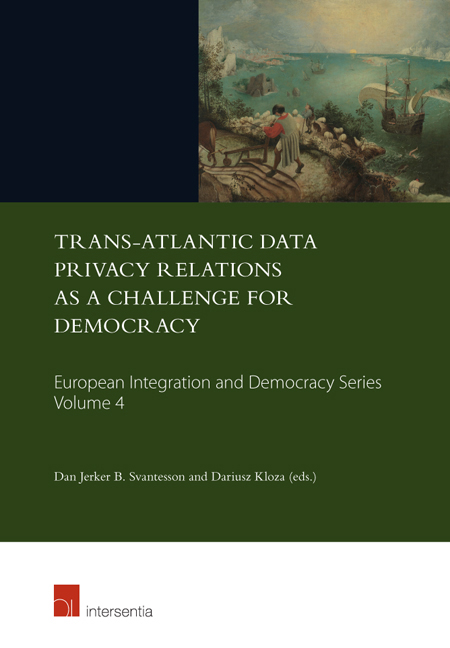Book contents
- Frontmatter
- Foreword
- Preface
- Contents
- List of Abbreviations
- PART I PRIVACY AND …
- SECTION I PRIVACY AND TRANSBORDER FLOWS OF PERSONAL DATA
- 1 Transnational Data Privacy in the EU Digital Single Market Strategy
- 2 Principles for US–EU Data Flow Arrangements
- 3 The Role of Proportionality in Assessing Trans-Atlantic Flows of Personal Data
- 4 US Surveillance Law, Safe Harbour and Reforms Since 2013
- INVITED COMMENTS
- SECTION II PRIVACY AND INTERNATIONAL TRADE
- INVITED COMMENT
- SECTION III PRIVACY AND TERRITORIAL APPLICATION OF THE LAW
- SECTION IV PRIVACY AND CRIME
- INVITED COMMENTS
- SECTION V PRIVACY AND TIME INVITED COMMENTS
- PART II THEORY OF PRIVACY
- PART III ALTERNATIVE APPROACHES TO THE PROTECTION OF PRIVACY
- INVITED COMMENT
- CONCLUSION
2 - Principles for US–EU Data Flow Arrangements
from SECTION I - PRIVACY AND TRANSBORDER FLOWS OF PERSONAL DATA
Published online by Cambridge University Press: 29 September 2018
- Frontmatter
- Foreword
- Preface
- Contents
- List of Abbreviations
- PART I PRIVACY AND …
- SECTION I PRIVACY AND TRANSBORDER FLOWS OF PERSONAL DATA
- 1 Transnational Data Privacy in the EU Digital Single Market Strategy
- 2 Principles for US–EU Data Flow Arrangements
- 3 The Role of Proportionality in Assessing Trans-Atlantic Flows of Personal Data
- 4 US Surveillance Law, Safe Harbour and Reforms Since 2013
- INVITED COMMENTS
- SECTION II PRIVACY AND INTERNATIONAL TRADE
- INVITED COMMENT
- SECTION III PRIVACY AND TERRITORIAL APPLICATION OF THE LAW
- SECTION IV PRIVACY AND CRIME
- INVITED COMMENTS
- SECTION V PRIVACY AND TIME INVITED COMMENTS
- PART II THEORY OF PRIVACY
- PART III ALTERNATIVE APPROACHES TO THE PROTECTION OF PRIVACY
- INVITED COMMENT
- CONCLUSION
Summary
INTRODUCTION
We are living in a knowledge and network society Exchanges of goods and services cannot take place without intensive data transfer The term ‘digital economy’ properly describes this change Data, information and knowledge are major elements of production; figuratively, they are the ‘new oil’ of the economy Knowledge is more and more organised in networks, organising trade flows and improving its efficiency, in particular concerning marketing and distribution In some areas, data, information and knowledge are the hard core of the business.
Much has been written about the transnational exchange of data The main challenge, however, still remains: data protection is an area of dissent in cyberspace governance Principles of international law, human rights and state sovereignty govern this area, with oft en very different regulatory aims: protection of private data and privacy, protection of trade secrets, protection of national security, protection of free speech, etc It is a challenge to find some modus vivendi for this important question Not all countries have data protection laws; few comply with the EU standards of data protection The EU has the ambition to establish its data protection law as a de facto standard worldwide Unfortunately, the Union lacks the flexibility required to develop international standards gradually.
Data, information and knowledge are interchangeable terms describing (subjectively) justified true beliefs in different forms and situations Data protection law typically uses its own abstraction, focusing on data containers and purpose limitation It has to be emphasised that data as such is a raw material, it constitutes only characters on paper or in electronic media Data has to be put in a container, e.g a document, a file, or a data stream, that can be used for a certain purpose For legal purposes, data can be classified in several – oft en overlapping – categories and is then subject to different rules: personal data, commercial data, open (or free) data, law enforcement data and intelligence data Detailed definitions are found in the respective instruments on data protection These types are dynamic, depending on regulatory goals restricting the use of the otherwise public good knowledge.
- Type
- Chapter
- Information
- Publisher: IntersentiaPrint publication year: 2017

